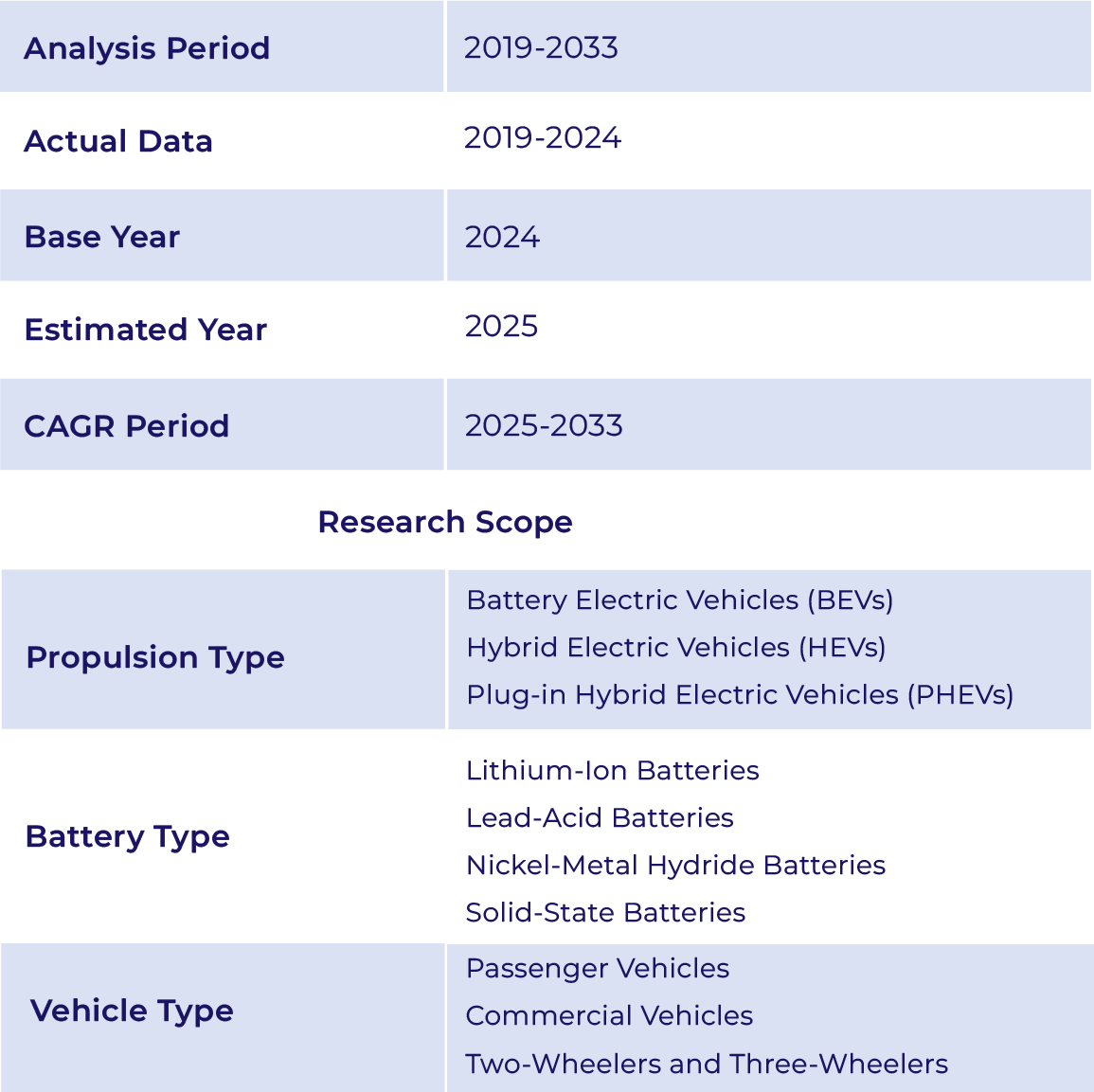Chile Electric Vehicle Battery Market Growth and Performance
- Marked by increased EV deployment, the Chile EV battery market expanded by XX% in 2024, pushing its valuation to US$ XX million.
- Analysts expect this upward momentum to continue, with the market projected to grow at a CAGR of XX% through 2033 and achieve a valuation of US$ XX million.
Chile Electric Vehicle Battery Market Outlook
Chile has solidified its position as a global powerhouse in the electric vehicle (EV) battery market, thanks to its unparalleled lithium reserves and strategic national initiatives. As the global shift toward electric mobility accelerates, Chile’s vast lithium resources, particularly in the Atacama Salt Flats, have become more critical than ever. Accounting for a significant share of the world’s lithium production, Chile is not just a supplier of raw materials but an emerging strategic leader aiming to control greater segments of the EV battery supply chain. With lithium-ion battery demand projected to surge past $194 billion by 2030, Chile’s proactive policies, investment in sustainable extraction technologies, and international partnerships have positioned it as a cornerstone of the green energy transition. Companies and governments around the world are increasingly turning their focus toward Chile, recognizing the country’s essential role in ensuring the stable, ethical, and sustainable sourcing of lithium for next-generation electric vehicles.
Chile’s National Lithium Strategy is reshaping the country's future in the global electric vehicle battery ecosystem. Under President Gabriel Boric's administration, Chile is moving to strengthen state participation in lithium production through partnerships rather than complete nationalization. A landmark initiative involves the joint venture between state-owned copper producer Codelco and private lithium mining giant SQM, targeting the rich lithium deposits of the Atacama Salt Flats. This collaboration aims to not only boost Chile’s lithium output but also to enhance environmental standards and ensure that local community’s benefit from the lithium boom. The strategic vision behind the National Lithium Strategy is clear: Chile seeks to move up the value chain by fostering local lithium refining, processing, and eventually even battery production, rather than remaining merely a raw material exporter. Global regulators, including the European Union and South Korea, have already approved the Codelco-SQM partnership, signalling strong international confidence in Chile’s structured approach to securing the future of EV battery supply chains.
Strategic international alliances further underscore Chile’s pivotal role in the EV battery market. In a significant development, Chilean lithium producer SQM signed a long-term lithium hydroxide supply agreement with Hyundai Motor Company and Kia Corporation of South Korea. This agreement not only secures a steady stream of critical battery material for two of the world’s leading EV manufacturers but also highlights Chile’s growing importance as a strategic partner beyond just resource extraction. SQM’s expansion plans to achieve 100,000 metric tons of lithium hydroxide production capacity by 2025 will solidify Chile’s leadership position in supplying the high-purity materials essential for advanced electric vehicle batteries. Such partnerships are examples of how Chilean companies are leveraging their natural resources into downstream market opportunities, reinforcing the country’s role as a critical node in the future of green transportation. Moreover, they also align with Chile’s broader goals of creating a more value-added, sustainable, and internationally integrated lithium industry.
Looking ahead, Chile is not only focused on boosting production but also on leading sustainable innovation in the global battery supply chain. Recognizing that long-term leadership requires more than resource abundance, Chilean stakeholders are increasingly investing in advanced technologies such as Direct Lithium Extraction (DLE) and supporting initiatives for battery recycling. These efforts aim to reduce the environmental footprint traditionally associated with lithium mining while making the entire supply chain more resilient and circular. Furthermore, through its National Lithium Strategy, Chile is promoting environmental stewardship by mandating higher standards for water use, community engagement, and land conservation in lithium projects. These developments position Chile as a model for how resource-rich nations can participate in the EV revolution without sacrificing environmental and social responsibility. As demand for EVs skyrockets and sustainability concerns become central to global supply chains, Chile’s leadership in responsible resource management will only grow in strategic importance.
By aligning its vast natural resources with sustainable innovation, robust public-private collaboration, and strategic global partnerships, Chile is transforming itself into more than just the world’s lithium capital—it is becoming the beating heart of the electric vehicle battery revolution. With initiatives such as the Codelco-SQM joint venture and supply deals with major automakers, Chile is demonstrating how a nation rich in resources can leverage them smartly to build long-term economic and environmental value. As the electric mobility market surges toward the $194 billion milestone, Chile’s influence will be felt not just in the mines of Atacama, but across every EV battery that powers the future of clean transportation worldwide.
Chile Electric Vehicle Battery Market Scope







